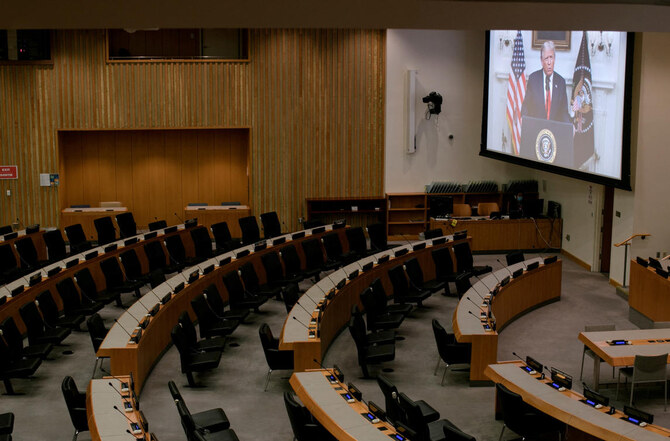GENEVA: The United Nations has been planning for the possible return of Donald Trump and the cuts to US funding and engagement with world body that are likely to come with his second term as president.
There was a sense of “déjà vu and some trepidation” at the 193-member world body, said one senior Asian diplomat, as Republican Trump won Tuesday’s US election over Democratic Vice President Kamala Harris.
“There is also some hope that a transactional administration will engage the UN on some areas even if it were to defund some dossiers. After all, what bigger and better global stage is there than the United Nations?” said the diplomat, speaking on condition of anonymity.
A US retreat at the UN could open the door for China, which has been building its influence in global diplomacy.
Trump has offered few specifics about foreign policy in his second term but supporters say the force of his personality and his “peace through strength” approach will help bend foreign leaders to his will. He has vowed to solve the war in Ukraine and is expected to give strong support to Israel in its conflicts with Hamas and Hezbollah in Gaza and southern Lebanon.
Among the top concerns at the UN are whether the United States will decide to contribute less money to the world body and withdraw from key multinational institutions and agreements, including the world Heath Organization and the Paris climate agreement.
US funding is the immediate worry. Washington is the UN’s largest contributor — with China second — accounting for 22 percent of the core UN budget and 27 percent of the peacekeeping budget.
A country can be up to two years in arrears before facing the possible repercussion of losing its General Assembly vote.
’Extremely hard’
Trump came to power last time proposing to cut about a third off US diplomacy and aid budgets, which included steep reductions in funding for UN peacekeeping and international organizations. But Congress, which sets the federal US government budget, pushed back on Trump’s proposal.
A UN spokesperson said at the time the proposed cuts would have made it impossible to continue all essential work.
“The UN secretariat has known that they could face a Trump comeback all year. There has been prudent planning behind the scenes on how to manage potential US budget cuts,” said Richard Gowan, UN director at the International Crisis Group.
“So (UN Secretary-General Antonio) Guterres and his team are not totally unprepared, but they know the next year will be extremely hard,” he said.
Trump’s team did not immediately respond to a query about his policy toward the UN after he takes office in January.
During his first term, Trump complained that the US was shouldering an unfair burden of the cost of the UN and pushed for reforms. Washington is traditionally slow to pay and when Trump left office in 2021 the US was in arrears about $600 million for the core budget and $2 billion for peacekeeping.
According to UN figures, President Joe Biden’s administration currently owes $995 million for the core UN budget and $862 million for the peacekeeping budget.
“I don’t want to pre-empt or speak about policies that may or may not happen, but we work with member states in the way we’ve always worked with member states,” Guterres’ spokesperson Stephane Dujarric told reporters on Wednesday.
In 2026, the UN Security Council will choose Guterres’ successor, a decision in which the Trump administration will hold a veto power.
’Great news for China’
During Trump’s first term, he was critical of the United Nations and wary of multilateralism. He announced plans to quit the World Health Organization, and pulled out of the UN Human Rights Council, the UN cultural agency UNESCO, a global climate change accord and the Iran nuclear deal.
When Biden succeeded him in 2021, he rescinded the US decision to withdraw from the WHO and returned the US to UNESCO and the climate agreement. Trump’s campaign has said he would quit the climate deal again if he won office.
“It will survive. But, of course, it will probably survive severely undermined,” Guterres told Reuters in September of a second withdrawal from the climate pact by Trump.
Ahead of the US election, a senior European diplomat said a Trump win would be “great news for China,” recalling that during Trump’s first term “the Chinese influence in the UN increased a lot because it was an open bar for the Chinese.”
The diplomat, speaking on condition of anonymity, said that if Trump again cuts UN funding and withdraws from international pacts “it will just give China the opportunity to present itself as the supporter number one of multilateralism.”
US funding for some other UN agencies is also in question. One of the first moves by the Trump administration in 2017 was to cut funding for UN Population Fund (UNFPA), the international body’s agency focused on family planning as well as maternal and child health in more than 150 countries.
Trump’s administration said UNFPA “supports ... a program of coercive abortion or involuntary sterilization.” The UN said that was an inaccurate perception. Biden restored US funding for UNFPA.
If Trump again cuts funding, UNFPA warned that “women will lose lifesaving services in some of the world’s most devastating crises” in places like Afghanistan, Sudan and Ukraine.
Under Trump’s first presidency, the US also opposed long-agreed international language on women’s sexual and reproductive rights and health in UN resolutions over concern that it would advance abortion rights.
A senior African diplomat, speaking on condition of anonymity, summed up the impending return of Trump for multilateralism and the United Nations: “The heavens help us.”














